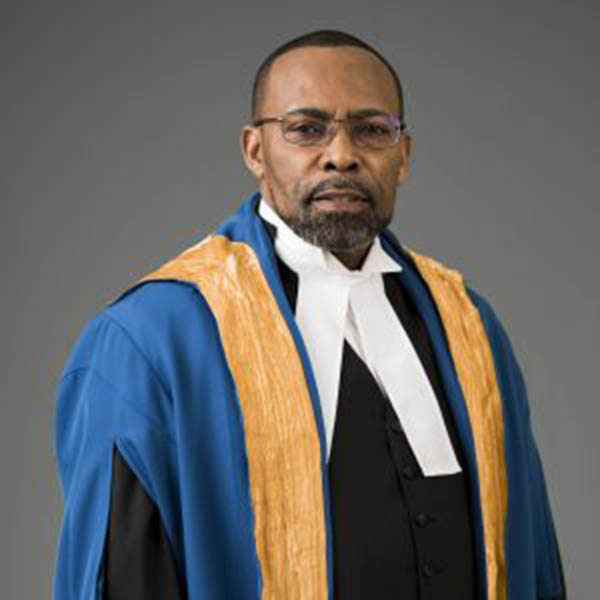Hon Mr Justice Winston Anderson is third most senior Judge on the Carib-bean Court of Justice (CCJ) and Chair-man of the CCJ Academy for Law. This commentary is not intended as an advisory opinion or a commitment to a particular legal position in any court proceedings.
A few weeks ago, an important date for our Caribbean identity slipped by largely unheralded and unnoticed. The Fourth of each July is Caribbean Community Day. But 4 July 2021 was also significant for marking the Twentieth Anniversary of the establishment of the CARICOM Single Market and Economy. The lack of fanfare which greeted this twin historical achievement contrasts with the genuine regional pride in accomplishment of Caribbean athletes three weeks later (23 July to 8 August 2021) at the Tokyo Olympics.
The Fourth of July
July 4th is American Independence Day commemorating the adoption on 4 July 1776, of the Declaration of Independence which announced the separation of the American colonies from Great Britain. That day is immortalized in the American psyche and celebrated with great pomp and circumstance across all 50 States of the Union. But July 4th is also CARICOM Day memorializing the signing on 4 July 1973, of the original Treaty of Chaguaramas by Prime Ministers of the then four independent states: Errol Barrow for Barbados, Forbes Burnham for Guyana, Michael Manley for Jamaica and Eric Williams for Trinidad and Tobago. It has become customary to mark CARICOM Day on the first Monday in July.
The adoption of the 1973 treaty was the birthplace of the Caribbean Community, which is the substitute for the more ambitious but ill-fated West Indian Federation. In addition to the Community, the Treaty of Chaguaramas established the common market to promote intra-regional trade by removing all import duties on goods of community origin. The treaty also promoted functional cooperation in related economic matters and encouraged coordination of foreign policy.
CARICOM Single Market and Economy
Twenty years ago, on Monday 5th July 2001, the Community took the further step of adopting the Revised Treaty of Chagua-ramas which re-established the Caribbean Community to include the CARICOM Single Market and Economy. Whilst maintaining a community of sovereign states the Revised Treaty deepened and widened regional integration. It prescribed principles to govern the community, enhanced institutional arrangements, provided for rights of community nationals to establish businesses, provide services, move capital, and travel throughout the community. The new treaty also provided for development policies in the areas of industry, agriculture, trade, and transportation. It also presented a competition policy, as well as rules on consumer protection, and novel dispute settlement arrangements.
The provisions with most visibility are those which guarantee the goal of free movement of community nationals and give specific categories of nationals the right to move to seek employment, provide services, and to set up businesses. Over 20,000 skills certificates have been issued to support this cross-migration and cross-pollination within the Community. The treaty arrangements also establish the Caribbean Court of Justice to decide disputes; thus far the CCJ has given 34 decisions in this trade jurisdiction primarily on issues to do with the protection of goods of Community origin and of free movement of Caribbean nationals within the Community.
Stabilizers of Caribbean Identity
The traditional enforcers of Caribbean identity have been under severe challenge for some time now. West Indian Cricket is no longer the dominant world force it was in the 1970s and 1980s; other sports have made calls on the limited catchment from which our athletes come. Regionality of education which once compelled UWI students and future leaders in the disciplines of medicine, law, and engineering to study together at Mona, Cave Hill, and St Augustine has been surrendered with the decentralization of the University. Significant fissures have emerged in the coordination of foreign policy; a particularly sensitive recent difference of positions led to the pronouncement of death of CARICOM by Camillo Gonsalves, one of our young and prominent politicians.
Still, other stabilizers of Caribbean identity have emerged and are emerging. From the late 1970s the Caribbean Examinations Council (CXC) has provided high quality and reliable examinations of international repute for the Community. CXC’s Caribbean Vocational Qualification (or CVQ) certifies competency and thus supports the free movement of skilled CARICOM nationals. Freedom of movement is also underpinned by the landmark decision of the CCJ in Myrie v Barbados which affirms the right of Community nationals to enter other CARICOM States for non-economic purposes and simply to enjoy a “sense of belonging” to the Community.
It would unquestionably enhance the Caribbean identity if we paid greater attention to celebrating the origins of the Caribbean experiment. The founding fathers bequeathed us a day to celebrate our Caribbeanness. The Fourth of July. It is a gift that is yet to fully accepted by us. Of the fifteen member states of the Community, only Guyana and Antigua and Barbuda recognize CARICOM Day as a public holiday. Every year, on the first Monday in July, they commemorate the signing of the original treaty of Chaguaramas, the birth certificate of regional integration. But no other country assigns this status to that day; not the other two original signatories of Barbados and Jamaica; not one of the other 11 Member States. Why is CARICOM Day not a National Holiday in all the Member States of the Community with the corresponding changes in educational curricula that that entails?
Conclusion
The glory brought to the region by our athletes in Tokyo was properly the source of pride for a regional audience still yearning for community. The pounding of the hearts and nerves and sinews of our representatives on the Astroturf of Tokyo deserves greater support from those of us responsible for fostering a sense of Caribbean identity.





